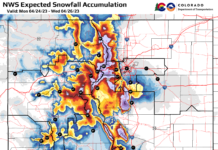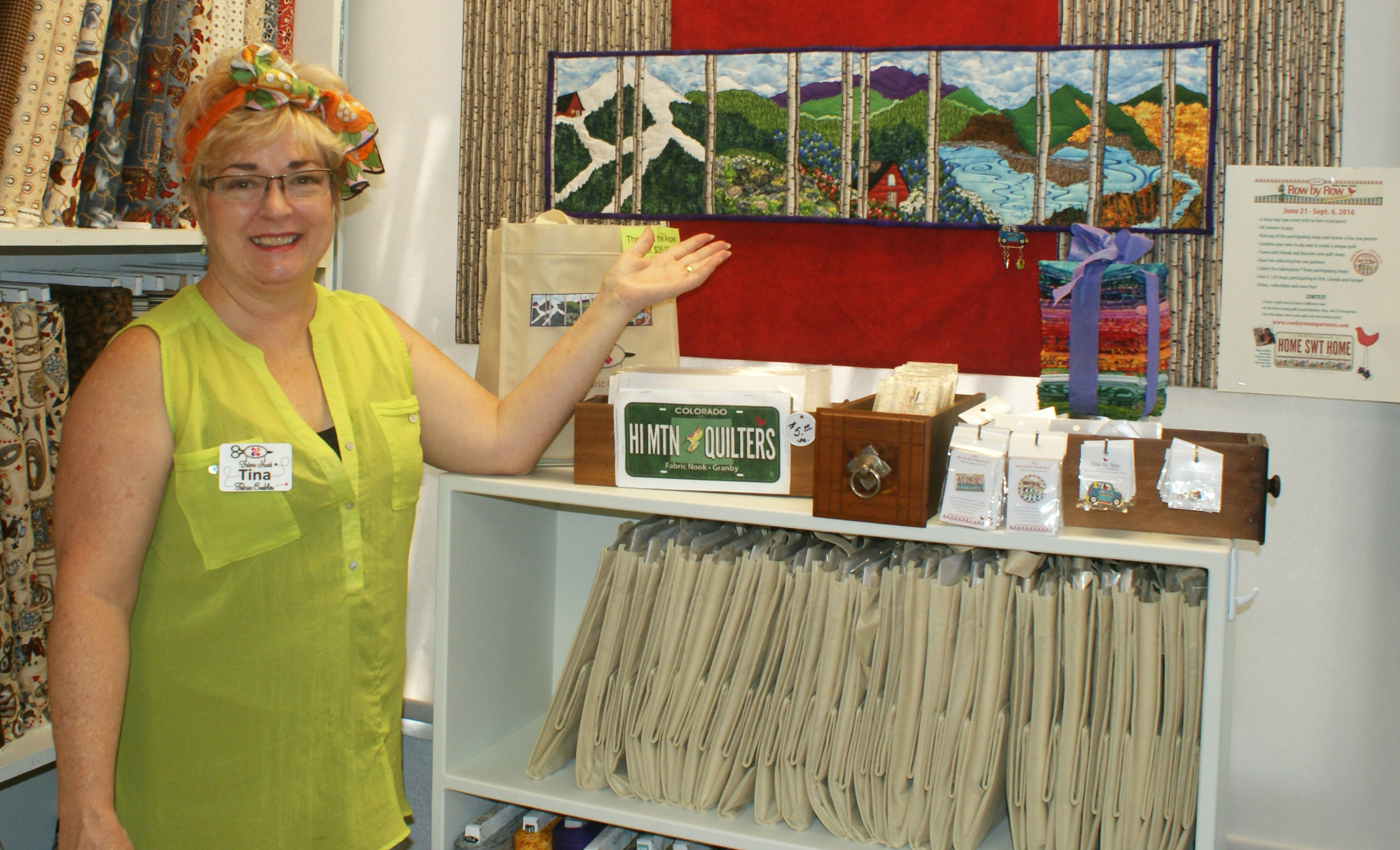The enemy in our midst midst
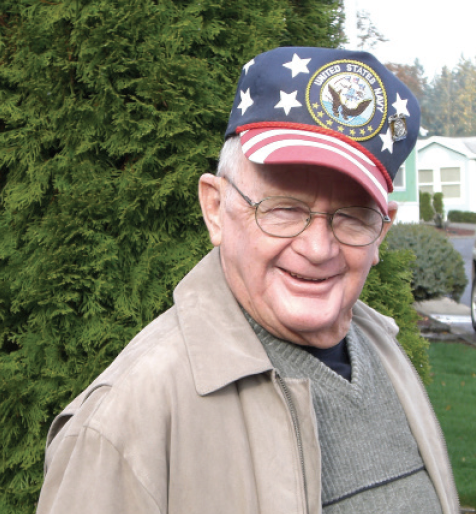
a lasting legacy of his memories even though he passed away in 2015.
by Bill Curran
It was a cold, clear crisp Christmas Eve in Kremmling. It was probably 10 below zero as a couple of other teenaged boys and I stood on the hillside next to the house that is now Clyde Overholt’s home, waiting… not for Santa Claus, but for an experience I will never forget.
At 11 o’clock, we could hear, faintly in the distance, singing. As we waited, straining our ears and eyes into the darkness, the singing gradually got louder and we could hear it was familiar Christmas carols, but with strange words.
It was a foreign language. It was German! It was 56 or 57 years ago, and we were at war with Germany.
As we listened to this beautiful music, carrying miles on this cold, clear night, and coming closer and closer, we gradually heard
the singers. A group of men it looked then like hundreds but was probably about 100, was marching and singing. Alongside marched several other men carrying rifles.
Christmas carolers and guns!
But these were strange times. They were prisoners of war. Their prison camp was at the ice plant at the mouth of Gore Canyon, about 2 miles away, and they were being marched down the railroad tracks to town to attend midnight mass.
When the marching Germans reached the depot and started up the hill, we ran to the church where I served as an altar boy. One side of the church had the pews roped off, reserved for the POWs. Our little congregation sat on the other side, waiting for the Germans to arrive.
As the prisoners started coming in, it was a very strange feeling. All of our people had husbands, sons or brothers who were far away, shooting at and being shot at by countrymen of these men entering our church.
Many faces showed hatred and anger. But, as these men filed in and our people saw that these were mostly just kids, barely older than I, and some older men, who also were far from their loved ones on Christmas – the hatred and not-well-hidden fear seemed to fade from the faces.
When everyone was seated and the American soldiers had moved to the rear of the church, where they stood at attention through the entire mass, a hush fell over the church.
One German, who couldn’t have been more than 17, with blue eyes and blond, crew-cut hair, stood up and began to sing the most beautiful version of “Ave Maria” I have ever heard. As he sang, I looked around. Here were these prisoners, who a few weeks ago had been shooting at our dads, big brothers and friends and who now were thousands of miles from their families in a strange country, not knowing what would happen to them on Christmas.
As the handsome young German sang, I noticed that not one eye in the church was dry . . . not just on “their side” of the church, but also on “our side.”
I will never forget the feeling that surrounded me that night, sympathy and pity for these men who were supposed to be our enemies . . . sympathy and pity for our people who had loved ones far away fighting this big war.
At the conclusion of mass, the Germans rose and began to sing “Silent Night” in German. They continued to sing as they filed out, leaving our people just sitting, many with tears streaming down their faces. I even noticed some smiles exchanged between “our people” and the “enemy.”
This was the true feeling of Christmas. “Love thine enemy” and “good will toward men.”
It was a Christmas Eve
I will never forget.
Oh, Christmas Oh, Christmas
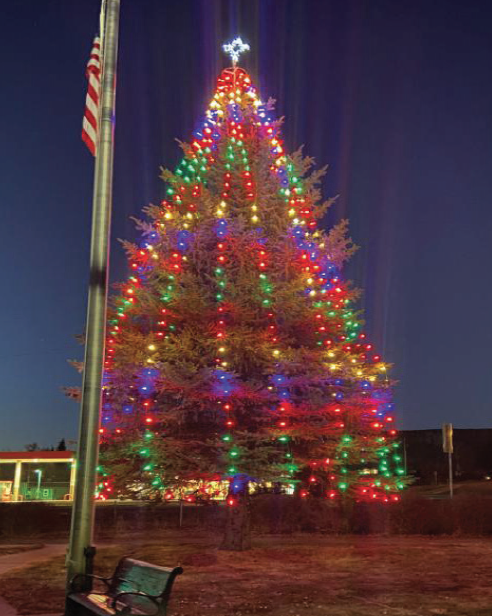
by Linda F. Willing
Other than gift shopping, my father was in charge of Christmas in our house. My mother handled the presents, an inspired gift-giver, she selected them throughout the year- but when December came, my father took control. He coordinated the Christmas cards, he engineered the outside lights, and he bought the food for holiday dinners.
But most importantly, he and he alone always selected the tree.
It was a ritual we all accepted without questioning. Sometime in early December, the perfectly cut Christmas tree would appear next to the garage, propped in a bucket of sugary water. On the 23 of December, the tree was brought into the living room and on the evening of the 24th, we decorated it. It had a week of glory in the house, and then on January 2, it miraculously disappeared, and all the ornaments and decorations were put away until the next year.
The year that my father was living apart from us, coming home only once or twice a month from his job in a different state, we almost forgot about the holiday altogether. It was two weeks into December when we were startled to realize that no lights were strung, no cards written, and most upsetting, no tree was waiting by the garage. My father wasn’t due home until Christmas Eve, and we were pretty sure he wasn’t bringing a tree with him. If we were going to have a Christmas tree, we would have to get it ourselves.
It was a cold night, threatening snow, when my mother and I went to the Christmas tree lot at the edge of town. Dozens of trees leaned against a long wooden fence. My mother had come directly from work, still wearing high heels and a pale wool coat, the color of butterscotch. She gingerly touched one of the trees, not wanting to break a nail.
What kind should we get? my mother asked. We wandered like refugees among the sea of trees, not knowing the difference between a Scotch pine and a Noble fir. How tall should it be?
Maybe we should wait until Dad gets home, I said.
Nonsense, said my mother, being careful not to touch her coat with the hand that had been on the tree. We can do this. We’ll just find the prettiest tree here. Look, what about this one?
She had reached into the wall of trees and pulled one up. She held it vertical and shook it to fluff out the branches.
Too short, I said, and she dropped it back to the fence.
What about this one she asked, pulling out another one. I shook my head.
My mother was gaining confidence and showing off a bit as she reached deeper into the pile of trees. This one? This one? And then it happened.
She was reaching to pull out a large tree and lost her balance, falling forward into the mass of greenery. Her feet were still on the ground, but her arms flailed helplessly; she looked like she was trying to swim out of the quagmire of branches she had fallen into. It was clear that she wasn’t injured, but her voice was muffled by the evergreen boughs, and her arms flopped around ridiculously as she struggled to get back on her feet.
There is some dispute about what happened next. I admit that I probably laughed. I was twelve years old, for heaven’s sake. But
I must have also helped her up because the moment passed quickly, and we did somehow find a tree to take home with us. In subsequent years, however, my mother always said that I ran when she did her head-first dive into the Christmas tree pile. It became a kind of ritual conversation, one of our Christmas traditions. My mother would begin:
And then I reached forward and fell into the trees, and you ran!
I did not!
Yes, you did! You ran away!Well, I was running for help, I said, and at this point my mother and I would always break down into fits of laughter.
I don’t know how my mother really felt when she fell into the trees. It must have startled her. Maybe she was frightened. It certainly wasn’t funny to her right then. But it must have seemed fitting in a way, that such a thing would happen in a season when nothing else seemed to be going right. By the time she was back on her feet, she caught her breath, and then laughed with me.
It was one of our best shared laughs ever. It was the only thing I remember keeping from that Christmas.
Linda Willing is currently a member of the local’s writer group in Granby. She is a Grand Lake resident.
Gaities of the Holidays 1885
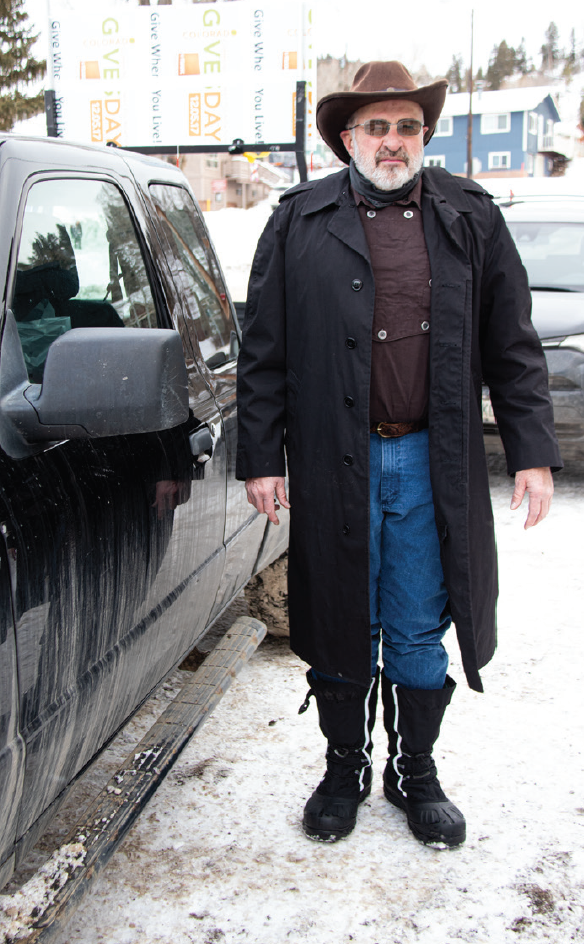
Editor’s note – this piece was originally printed in the Grand Lake Propsector on January 9, 1886. It was submitted for the Grand Gazette Christimas Edition by Donald Dailey
Dec. 24, 1885, Hot Sulphur Springs, Colo. Editor of Prospector: The last days of the old year are gone. Our holidays were the jolliest we ever had at the Springs, and all who visited us had a pleasant time. On Christmas eve, we had a school exhibition which was largely attended. The audience was well pleased with the little folks and the little folks were all pleased with the audience. All “spoke their pieces” well.
The program was as follows: Music Quartet-Arise and Shine, Christmas Greeting- Maude Marker, Christmas Guests-Lettie Chi pman, Hang up the Baby’s Stocking- Bessie Bessey, Be Glad and Sing-Frank Cantonwine, My First Speech-Callie Finney, The Snow Birds-Georgia Smith, The Boot Black -Roy Marker, The Robin’s Nest-Mable Smith, SanGabriel-Ellie Cantonwine, Music Duet and Chorus-Refuge, The Three Bells of Glasgow-Charlie Swinburn, The Schoolmasters Guests-Maude Marker, The Wreck of the Hesperus-Ellie Cantonwine, Music Quartet- Hark! Hark! Oration over Julius Caesar -J. Jansen, He Could Not Spell It-John Gardner, The Last Hymn-Maude Marker, Music and Song-Jedediah, Shadow Picture Homeward March by the way of Barley Bright, Christmas Cantata-A Bunch of Sticks. Excused.
After this we had a Christmas tree, well loaded with numerous presents for the little folks, big folks, young folks, and old folks, such as dress patterns and overalls, books, candy, rattle boxes, tin horns, dolls and trail sleds.
At the conclusion of these exercises Mr. Kinney’s dining room was cleared and everybody joined in a social dance. At 12 o’clock a supper was served at the Veatch House and was excellent in every respect.
Dancing broke up at eight in the morning, and everyone went home well pleased with the night’s festivities.
On Tuesday, Dec. 29th, occurred the 63rd birthday of Mr. Calvin Kinney, the pioneer hotel keeper of Hot Sulphur Springs. Mr. Kinney invited his friends to dine with him in honor of the occasion, and his invitation was generally accepted. The table was filled with all the delicacies of the season. Those present were Mr. and Mrs. W. Veatch, Dr. and Mrs. David Bock, Mr. and Mrs. F.S. Byers, M r. and Mrs. E. Marker, Mr. and Mrs. P.H. Smith, M r. and Mrs. David Gardner, Mrs. Chipman and Messrs. Jones, Thompson, Wilkins, Kauffman, Hayden, and Hook. After supper the evening was spent in singing, chatting, and “loafing,” and all went home wishing Mr. Kinney many happy returns of the day.
On New Year’s night everybody had a dance. It was what some folks called a basket dance. Everybody brought a lunch and some more than a square meal. The dance was held in the basement of the Kinney House, and was kept up until about eight in the morning… A. Fisher. – The Grand Lake Prospector.


